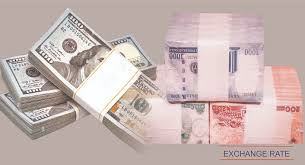
Dollar to Naira exchange rate today, November 24, 2025
On Monday, November 24, 2025, the naira was valued at approximately ₦1,456 against the US dollar in the Nigerian Foreign Exchange Market (NFEM), while the parallel (black) market in Lagos reported an average exchange rate of around ₦1,465 for the greenback.
Interpretation of the figures
The official NFEM (volume-weighted) rate stands at about ₦1,456 per US$1, as per market reports and exchange-data services that monitor the Central Bank of Nigeria’s (CBN) daily NFEM series.
Parallel/black-market rate (Lagos): Traders have listed offers nearing ₦1,465/US$1, with certain locations quoting slightly higher based on cash availability and geographical factors.
Short-term fluctuations
The NFEM rate has remained relatively stable in recent days, hovering around the mid-₦1,400s, following a phase of significant volatility earlier in 2025. Overnight and intraday fluctuations have diminished as foreign exchange liquidity has shown modest improvement, according to market analysts. Data from TradingEconomics and other services indicate that the USD/NGN pair is trading slightly lower than the peaks observed earlier this month.
Factors influencing the naira’s current status
Several elements continue to influence the trajectory of the naira:
Central bank policy: The Central Bank of Nigeria’s (CBN) published NFEM rates and policy measures serve as the foundation for official market pricing. Market participants indicate that CBN interventions and foreign exchange allocation regulations have contributed to stabilizing the official market this month.
Foreign exchange supply and oil revenues: Nigeria’s foreign exchange inflows, derived from oil exports and foreign portfolio investments, have been inconsistent. Any enhancement in upstream revenues or inflows tends to alleviate pressure on the official market; conversely, weak inflows increase demand in the parallel market.
Demand in the parallel market: The need for cash, the scarcity of smaller US dollar denominations, and the urgency for quicker settlements maintain a consistent premium in the parallel market compared to the NFEM. Real-time monitoring indicates that the spread between official and parallel rates in the black market fluctuates daily.
Implications for Nigerians
For both consumers and businesses, the disparity between the NFEM and parallel rates influences import expenses, remittance amounts, and the pricing of dollar-denominated products. Importers unable to access the official market may still encounter the premium of the parallel market when acquiring dollars for immediate transactions. Financial advisors suggest utilizing authorized FX channels whenever feasible and keeping an eye on official CBN announcements for substantial transfers.
Future Outlook
Experts indicate that the short-term direction of FX will depend on: (1) weekly FX allocations and communications from the CBN; (2) the rate of foreign investments in government and corporate securities; and (3) oil export revenues and global crude oil prices. Any significant alteration in these factors could lead to a notable shift in either the NFEM or parallel market rates within a matter of days.





